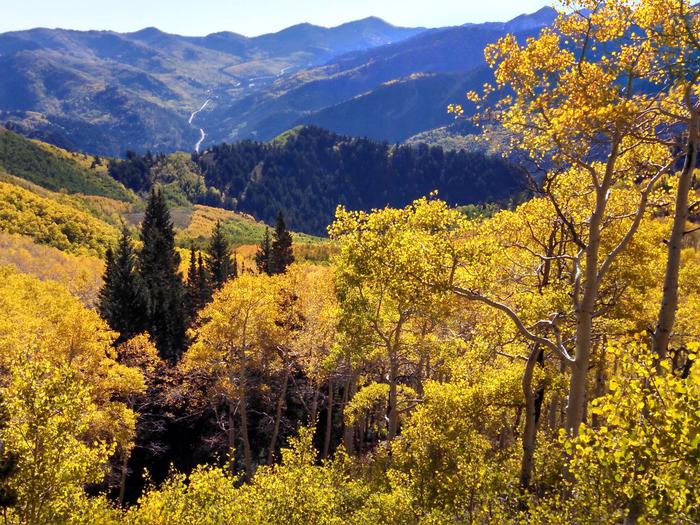Big Cottonwood Canyon Scenic Byway
Department of Transportation.
Along this twisting byway, visitors can expect to see spectacular views of rugged rocky peaks and beautiful mountain streams. Moving up in elevation is like a layer cake of biological zones, each with its own microcosm of temperature, water, geology, and sun aspect. The canyons are named for the enormous cottonwood trees that grew near the creek bottoms, and are known today for the aspen forests that burst into eye-popping shades of red, orange, and yellow each fall. All along this byway, you will find picnic areas, campgrounds, and hiking trails. Bounded by the Mount Olympus and Lone Peak Wilderness Areas, Big Cottonwood Canyon provides refuge for a surprising diversity of wildlife so close to an urban environment. Resident species include large mammals such as mule deer, elk, moose, mountain goat, mountain lion, and bear. Small mammals include coyote, fox, beaver, badger, ferret, rabbit, mice, marmot, and others. Bird sightings include a range of raptors from hawks to eagles, as well as owls and migratory birds. Reptiles, amphibians, and fish live in and around areas with water. Visitors often spot canyon wildlife along the water’s edge at dusk or dawn. The Wasatch Mountains reach over 11,000’ and the picturesque winding canyon roads access communities as high as 8,500’. Tectonic activity long ago formed the flat valleys and high mountains that each winter trap storms moving in from the west, dropping 20 to 50 feet of world-famous powder snow. Near the top of the canyon, the ski areas at Brighton and Solitude offer world-class skiing over some of Utah's most beautiful terrain.
Directions
Navigating the Byway:
The Big Cottonwood Canyon Scenic Byway begins at the intersection of Wasatch Boulevard and Fort Union Boulevard, in Cottonwood Heights, Utah.
Take E. Big Cottonwood Canyon Road (UT-190/UT-160) east.
At Storm Mountain the road twists and turns through folded rock formations, with an occasional glimpse of climbers on towering rock faces. At Reynolds Flat, meadows open up to show a meandering stream, wetlands, wildlife, and views of Cardiff Fork to the high peaks of the Wasatch Mountains.
Continue onto Wasatch Mountain State Park Road to reach the Silver Lake Visitor Center at Brighton, Utah, where the byway ends.

